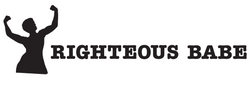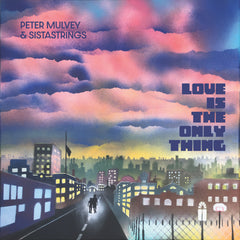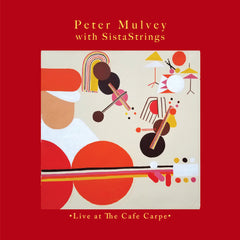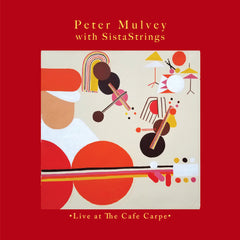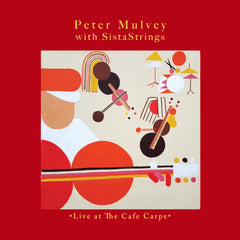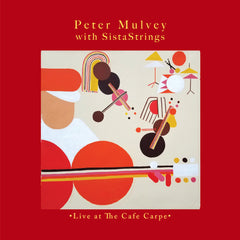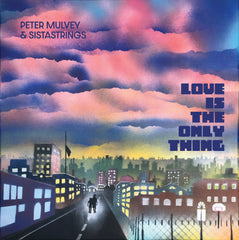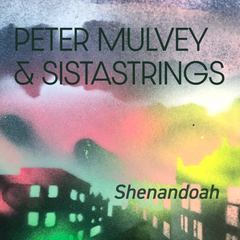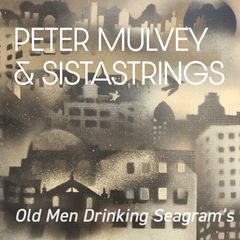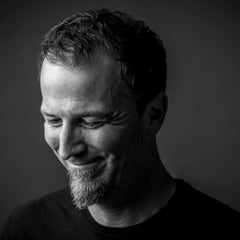
Eighteen records, one illustrated book, thousands of live performances, a TEDx talk, a decades-long association with the National Youth Science Camp, opening for luminaries such as Ani DiFranco, Emmylou Harris, and Chuck Prophet, appearances on NPR, an annual autumn tour by bicycle, emceeing festivals, hosting his own boutique festival (the Lamplighter Sessions, in Boston and Wisconsin)… Mulvey never stops. He has built his life’s work on collaboration and on an instinct for the eclectic and the vital. He folds everything he encounters into his work: poetry, social justice, scientific literacy, and a deeply abiding humanism are all on plain display in his art.
Early in 2017, a series of upheavals found Mulvey living through a winter in a friend’s empty house in the small Midwestern town of Fort Atkinson. Unmoored and lost in the middle of his life, walking hours each day, sometimes with friends but most often alone, along the frozen marsh of the Bark river and through the wintry oak savannah nearby. The songs came in fast and strange and vivid. At night he wrote them down at a table in the spare house, just a mile from the Cafe Carpe (which Mulvey describes as his spiritual home). These songs became his new record, “There Is Another World,” a vivid dreamscape of imagistic, haiku-like auditory sketches, within which are plenty of wrenching, haunting, and even sweet songs.
The opening track of “There Is Another World” is “The Fox”, a hypnotic pulse of altered guitar within a swirl of sounds: wineglass rims by Jonny Rogers, the long breaths and clatter of Idit Shner’s bass clarinet, icy tones from Rob Burger’s accordion. Over all this, Mulvey’s gravel baritone delivers an almost haiku-like rendering of fox tracks in the snow.
“Who’s Gonna Love You Now?” poses its aching question across Mulvey’s warm fingerpicked guitar, Eric Heywood’s cloud-like pedal steel, and a piano altered to sound like buoys in fog. Then, “When I Was in Monaghan” ups the ante. As Jenny Scheinman’s violin colors the urgent picking of Mulvey’s guitar, the lyrics telegraph irreconcilable pain and loss, and the haunting chorus, “Beware, o traveler — for the road is walking too” is almost wailed out. The line, from a Jim Harrison poem, begins a deep dive into both the winter landscape and the rich inner landscape of the poets Mulvey has revered and referenced throughout his long career.
“Fool’s Errand” is a warm, wistful, up-tempo reminiscence of a life summed up over driving, strummed guitar and soaring pedal steel. Then, “False Indigo” returns us to the wintry, vivid landscape of the opener: altered, percussive guitar, threading its way through a swirl of actual water, an old Blind Willie Johnson sample, and clarinet and pedal steel. The lyrics are incantatory, cryptic and terse.
A brief, solemn elegy, “Beckett was a Bird of Prey” salutes Mulvey’s old friend, his Irish agent Larry Roddy, who died in 2010. And then side one is suddenly over with “Strayaway”, a fragment of an Irish fiddle tune, rendered in cross-faded altered guitar and then violin.
Side two illuminates the rules of this new world. “To Your Joy” is a brutally forthright and intimate telling of love lost: “I widowed you/when I martyred myself/to my gods. And you widowed me/when you martyred yourself/to your gods. Now I say to you/in all good faith/goodbye.” The heart of the song is a wrenching howl from Heywood’s pedal steel and Scheinman’s strings.
Next, a curious little outlier, “Nickel and Dime”, is just seventeen seconds long with a lyric from a tiny poem in Ted Kooser and Jim Harrison’s book “Braided Creek”. Its tone is deceptively light, and it’s gone almost immediately, giving way to a driving pulse of altered guitar for “Henry’s Only Daughter.” Accompanied only by wineglasses and the guitar, Mulvey coughs out a brooding lyric addressed directly to the late poet of Blackhawk Island, Lorine Niedecker, whose cabin sits just a six-mile walk from the little house in Fort Atkinson.
“All Saints’ Day” is a sudden shift, delivered with a wistful slow air, legato guitar and singing in unison, quoting both Yeats and the Palestinian/Texan poet Naomi Shihab Nye. This record is rife with poets.
The record closes with “The Cardinal”, a second elegy, this time for a dear friend long gone. It repeats, three times, Rilke’s admonition: “You must change your life” and then, after an otherworldly pouring out of glassy, multiple violin tones, inverts the admonition into the poet Mary Oliver’s question: “And have you changed your life?”
Finally, a postscript: with “Owl” we are back in the woods, where we began, with the ensemble breathing and pulsing all around us, as Mulvey’s hoarse voice growls out a late-night draft of a thank you note: “That owl you have seen… she has a mate… I saw them together in the thicket by the cottonwood… thank you for showing me that spot.”
The thirteen tracks of the record amount to a remarkable, brief, potent stab. Alienation, loss and heartbreak, all are rendered lucid, even beautiful, in the bright-dark sideways light of deep winter. It is also a story of renewal, through close attention and a determined stillness, a piercing gaze toward detail and an opening toward simple acceptance of what is.
Order from your preferred digital outlets: https://lnk.to/thereisanotherworld
